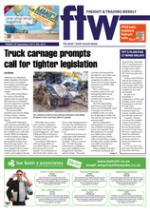Politicians are rallying for
tighter legislation that holds
truck owners accountable
for accidents caused through
unroadworthiness or poor
service maintenance of their
vehicles.
This call to action follows
the release of horrifying
statistics that 40 people have
died and close to a hundred
have been injured in accidents
involving trucks since the
beginning of September.
The general public
meantime has started calling
for bans of heavy vehicles
on roads with high accident
figures.
In KwaZulu-Natal these
calls reached a peak following
the deaths of 23 people after a
truck ploughed into a car and
four minibus taxis earlier this
month. While investigations
into the incident are ongoing
– with claims of the brakes
having failed and the truck
licence having expired – the
truck driver has formally
been charged with 23 counts
of murder and one count of
reckless and negligent driving.
When this issue went to
print a petition calling for a
ban on heavy vehicles on the
particular road where the
accident happened – the Field’s
Hill Road (M13) in Pinetown
– had already passed the 7500
signatures mark.
According to Mike Brews,
chief operating officer of
Associated Marine, accidents
have increased in recent
months. “In our business we
don’t look at the vehicles, but
from a cargo damage point of
view there has definitely been
an increase in the number of
accidents and it is a concern
to us.”
He said many factors were
at play that could contribute
to the higher number of
accidents. “There is systemic
risk – be it the decaying
infrastructure resulting in
poor road conditions or not
enough driver education
and knowledge. The tough
economic environment has
also played a role in that costs
have increased and many
companies are under severe
strain and are trying to get the
maximum out of their staff
and resources.”
Brews said from an
insurance point of view risk
management had become
crucial and there were
incentives for companies to
decrease risk.
“Be it through putting
restrictions on how long a
driver can be behind the wheel
or having a second driver
available to take over, these
are all attempts to reduce the
risk and have an impact on the
premium paid.”
Between September 1
and September 11 a total of
nine accidents involving ten
trucks were reported. Near
Bloemfontein seven people
were killed when a truck
collided with two vehicles,
while in North-West a couple
and their nine-month-old baby
were killed when their car
collided with a truck.
Other accidents took place
in Pretoria, Germiston and
Bedfordview.
KZN MEC for transport,
community safety and liaison,
Willies Mchunu, has vowed
to work towards tightening
legislation around truck
owners’ accountability.
Several other MECs in the
country have joined his cause.
According to a spokesman
for the Automobile
Association, this is just one
of the issues that needs to
be addressed if long-term
solutions are to be found.
“Yes, more truck owners
have to be held accountable
because a large number
of trucks on the roads are
overloaded or have records
of poor service maintenance,
but just as importantly we
have to increase truck driver
training. We are sending
drivers out onto the roads
without adequate skills
and knowledge. Increased
training is vital.”
At the same time issues
around driver licensing
in the country also have
to be addressed, said the
spokesman.
While official figures are
not available, it has been
alleged that some 40% of
all drivers’ licences issued in
South Africa are fraudulent.
“Along with that more
visible policing is needed and
more data has to be captured
around accidents – where are
they happening, what are the
causes, who is involved. We
don’t have much granular
detail.”
In this regard the Road
Traffic Management
Corporation (RTMC)
responsible for monitoring
accidents has not provided
any up-to-date statistics
around truck accidents in
more than three years.
“There is a document
available from 2011 but it is
very superficial. We cannot
solve the problem if we don’t
know what the problem is,”
said the spokesman.
With costs escalating
around the increased number
of accidents, Brews maintains
that solutions have to be
found.
“One has to look at the
problem holistically. Banning
trucks off the roads or only
looking at truck operators is
not the answer. No one person
is to blame. It would just be
shortsighted to approach it
like that. Clearly we need a
collective effort to solve the
problem of truck carnage.”
CAPTION
The remains of some of the vehicles involved in the deadly
Pinetown truck crash that killed 23 people

